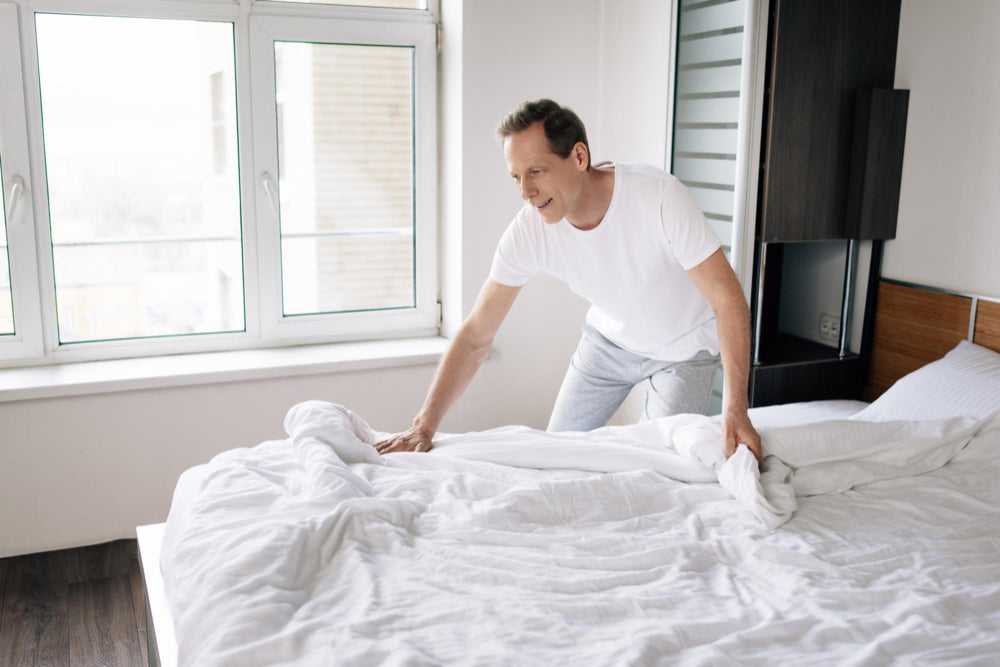SHOP

How to Deep Clean a Mattress (Why You Should)
January 31, 2024 6 min read
1. Reasons Why You Should Deep Clean Your Mattress |
1.1 Your mattress collects dead skin cells, sweat, and dust. |
1.2. Dust mites lurk in your mattress. |
1.3. Coronavirus can linger on the surface. |
When was the last time you gave your mattress a deep clean? Maintaining a clean mattress is crucial for both hygiene and health. In this guide, we'll explore reasons why you should prioritize a deep clean mattress, and provide a step-by-step approach on how to deep clean your mattress effectively.
1. Reasons Why You Should Deep Clean Your Mattress
1.1 Your mattress collects dead skin cells, sweat, and dust.
Even with good hygiene practices, our bodies shed dead skin cells during sleep. These, combined with sweat and dust, create an ideal breeding ground for bed bugs. These critters suck on exposed skin while we sleep and can pose health risks. As recent studies suggest, bed bugs can transmit a parasite that might spread diseases like Chagas. So, how can you protect your sleep haven? Discover effective methods on how to clean mattresses from bed bugs and protect against potential health risks.
1.2 Dust mites lurk in your mattress.

Image credit: Gilles San Martin from Namur, Belgium
A 2015 study in Singapore revealed that mattresses harbor the highest concentration of dust mites. The droppings of these microscopic creatures can lead to asthma, allergies, and skin irritations. Discover how to protect your mattress from these invisible invaders.
1.3. Coronavirus can linger on the surface.
While bed bugs and dust mites have been longstanding concerns, the recent coronavirus scare adds another layer of importance to mattress cleanliness. Learn how to protect mattresses from bed bugs and address potential viral risks associated with your sleeping space.
This may not be as common as bed bugs/dust mites, but knowing how contagious the coronavirus can be, it helps to apply precautionary measures. Infectious Diseases Specialist Dr. Isaac Bogoch says that the coronavirus can linger on various surfaces between 2 hours to several days, and mattresses are no exception.
II. How to Deep Clean Your Mattress: A Step-by-Step Guide
Embark on the journey of maintaining a clean and healthy mattress with this comprehensive step-by-step guide.
Step 1: Strip the bed clean then wash your bedding
Separate and remove mattress covers, sheets, and pillowcases and chuck them into the washing machine. Make sure to wash everything in hot water under 40C and tumble dry on high for 28 minutes minimum to get rid of the dust mites and viruses.
Bed bugs have a life cycle of 2 weeks, so washing your bed sheets at least every 2 weeks is required. If you go out often, due to the pandemic you might want to consider washing your sheets more frequently.
Step 2: Vacuum all over the mattress
Give your mattress a thorough vacuuming to eliminate skin flakes, bugs, and bug feces. Make sure to go over the entire surface, including the sides and seams to get all the hidden dust and other particles.
Step 3: Spot clean stubborn stains
You can use a homemade cleaning solution of water and vinegar in a spray bottle. Spray and blot the spot dry, repeating as necessary.
Step 4: Deodorize the mattress to keep it smelling fresh
Sprinkle baking soda on top of the mattress and leave it for several hours to leave it smelling fresh and clean or until it is dry. Vacuum again to remove the presence of any baking soda to finish.
III. How to Preserve Your Mattress After Cleaning

After deep cleaning your mattress, it’s important to protect it so you can enjoy it for a long time to come. Once it’s completely dry, it will be fresh and clean. A good mattress cover is suggested for protection from soiling. This forms a good foundation for some fresh, crisp bed linens.
You may now choose to go for some pure comfort and luxury by layering a duvet on top. This is sure to turn your bedroom into the oasis you deserve, a true sanctuary, much-needed for your well-being, and good rest in this post-pandemic era.
A nice duvet will not only keep you comfortable for a more restful sleep but by protecting it with different duvet covers, you can effortlessly and efficiently change the look of your bed and room without the need to completely redecorate your space. Meanwhile, your mattress continues to be preserved for a long time.
Protecting your mattress will make cleaning easier in the future. Should you have accidental spills, dirt, or other unpleasant particles, you can always throw your duvet cover, sheets or mattress cover into the washer.
The struggle with the duvet, however, is how to put the duvet cover on. Fortunately, the Beddley innovative duvet covers with a patented design make this unpleasant task so easy. With duvet covers from Beddley, protecting your duvet and in turn protecting your mattress has become a fast and easy task.
IV. How to Protect Mattress from Bed Bugs?
To protect your mattress from bed bugs:
- Use Mattress Encasements: Invest in bed bug-proof mattress encasements that fully cover the mattress.
- Regularly Wash Bedding: Wash sheets, pillowcases, and mattress covers frequently in hot water.
- Vacuum Thoroughly: Regularly vacuum and clean the mattress, paying attention to seams and crevices.
- Inspect and Seal Cracks: Regularly inspect and seal any cracks or gaps in the bed frame and surrounding areas.
- Be Cautious with Secondhand Furniture: Avoid bringing in used furniture without thorough inspection for bed bugs.
These measures help create a barrier and maintain a clean environment, reducing the risk of bed bug infestations.
V. Frequently Asked Questions
1. How often should you vacuum your mattress?
It is recommended that mattresses be vacuumed every three to six months or even monthly. If you are highly allergic to dust particles, it is highly advisable to vacuum more frequently to remove these allergens.
2. What causes yellow stains on mattresses?
Yellow stains may be caused by the excess sweat released onto the mattress. Over time, it is common for mattresses to become discolored and musty smelling from accumulated sweat.
3. How do I get a deep stain out of a mattress?
Just mix a fifty percent solution of water with a fifty percent solution of white vinegar in a spray bottle.
Once the mixture is ready, spray the stain and blot with a clean cloth. Repeat until the stain has disappeared.
4. How to deep clean bed sheets?
To deep clean bed sheets, start by separating them from the mattress and other bedding. Wash them in hot water, preferably above 40°C, to eliminate dust mites and bacteria. Use a quality detergent and consider adding vinegar to neutralize odors. Tumble dry on high for at least 28 minutes to ensure thorough cleaning. Repeat this process every two weeks, especially in pandemic times, to maintain a hygienic sleep environment.
5. How do I address the issue of dust under bed?
To address dust under the bed, regularly vacuum the space using a nozzle attachment. Minimize clutter, consider using under-bed storage containers, and clean the area frequently to reduce dust accumulation.
6. How much dead skin is in a mattress?
The amount of dead skin in a mattress can vary, but on average, a person sheds about 1.5 grams of skin per day. Over time, this accumulation can contribute to the presence of dead skin in a mattress. Regular cleaning and maintenance, including vacuuming, washing bedding, and using mattress protectors, can help manage and reduce dead skin buildup..
7. How to take care of dead skin cells on mattress?
To address dead skin cells on a mattress, vacuum regularly, wash bedding frequently in hot water, use a mattress protector, expose the mattress to sunlight, and spot clean stains as needed.
8. How to eliminate dead skin flakes in bed
To eliminate dead skin flakes in bed, wash bedding regularly, vacuum the mattress, use mattress protectors, expose the mattress to sunlight, and consider an air purifier.
9. How to protect your mattress?
To protect your mattress, use a quality mattress protector, wash bedding regularly, vacuum the mattress, and consider using an additional barrier like a bed bug-proof encasement.
The Takeaway
Prioritizing regular deep-clean mattress sessions is crucial for health reasons. Follow the comprehensive guide on how to deep clean a mattress for a healthier sleep environment. Consider professional deep cleaning at least twice a year to prevent odors, bacterial growth, and stubborn stains, ensuring your mattress remains a clean and comfortable haven.
Leave a comment
Comments will be approved before showing up.
Subscribe
Sign up to get the latest on sales, new releases and more …
